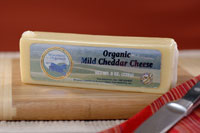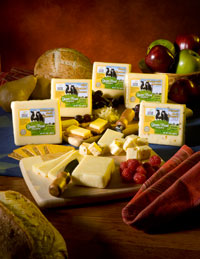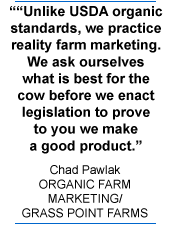 |
|||


|
 |


|
|

February 19, 2010 |
|||
| Organic Farm Marketing won’t skirt the spirit of natural agriculture Grass Point Farms utilizes Certified Pasture standards; Wisconsin Organics uses locally-produced organic milk |
|||
By Kate Sander THORP, Wis. — As many consumers become increasingly interested in where their food comes from, there are growing opportunities for cheese companies to step in and provide products that fill new niches. That is what Chad Pawlak, president, Organic Farm Marketing, has set out to do: meet the needs of consumers who want to know their foods’ origins while providing a stable marketplace for local Wisconsin farmers and cheese plants. These are dual missions that Pawlak believes go hand-in-hand, and goals that he has worked toward for the last seven years since becoming Organic Farm Marketing’s president. When Pawlak took the helm of the firm, its primary brand was Wisconsin Organics, a line of organic cheese and milk products produced by a couple of local dairy plants and marketed by Organic Farm Marketing. Unfortunately, though, Pawlak feels the overall organic dairy market has been stymied by USDA standards that have hindered the value and growth of the organic dairy industry. One of the key stumbling blocks: access to pasture. Currently, national organic standards don’t require cows producing organic milk to have regular access to pasture. And while USDA this past week issued a final rule to require pasture access, the issue has been — and may continue to be — fraught with conflict. Pawlak decided four years ago that it wasn’t worth engaging in a political battle. “All of us in the organic industry need to reach a consensus, and we haven’t been able to do that,” he says. “We decided not to spend our resources getting Washington to define organic,” he adds. Instead, seeing that consumers value milk and cheese from grass-fed cows, Pawlak and his team developed a new segment of the business. Started in October 2005, Grass Point Farms now is a quickly-growing brand and business It’s also much more than perception. The company is working hard at producing products for this natural market niche that meet the spirit of what many organic shoppers are looking for. “Unlike USDA organic standards, we practice reality farm marketing,” Pawlak says. “We ask ourselves what is best for the cow before we enact legislation to prove to you we make a good product.” To that end, Pawlak and his team have developed stringent Certified Pasture standards to which Grass Point Farms requires all of its farmers to adhere. Pawlak says these are the first standards to be developed for grass-fed dairies. The company has trademarked the Certified Pasture name. “Someone has to carry the torch,” he says. The standards were developed by Grass Point Farms, local supplying dairy farms, veterinarians and researchers. In general, they encompass three priorities: the cows’ diet, treatment of the animals and land conservation management practices on the dairy farm. While the cows obviously don’t graze in winter — Wisconsin’s snow-covered fields don’t allow for that — they do have regular access to the outdoors year-round and are required to receive more than 50 percent of their diet from grass or hay all year round.
In an effort to continue supporting the family farm and a close relationship between the farmers and the cows, one of the standards also requires that 50 percent of the labor for the dairy farms comes from owners of the farm. “These are truly family farms,” Pawlak says, noting there are 12 dairy farm families presently supplying milk for Grass Point Farms. These 12 dairies are annually audited by a third party to ensure that they are meeting the standards that have been developed. The milk produced by these dairies then is made into cheese, butter and fluid dairy products by three cheese plants, located in Wisconsin, and two bottlers. Grass Point’s milk is available in Wisconsin and Indiana, where it is bottled. The cheeses, which are sold in both random and exact weight packages primarily for retail in the dairy case and deli, are available in 18 states, primarily in the Upper Midwest, Ohio Valley, Colorado and Florida. The grass-fed product line has a number of marketing strengths, according to Pawlak. First, of course, is the quality: Cows fed a diet rich in grass produce milk with a richer and creamier flavor, and studies have shown the milk to be higher in naturally-occurring CLA and omega-3s, he says. In addition, the price point for the products is a bit below that of organic products, putting the grass-fed products in a competitive price position. Pawlak believes the grass-fed segment of the market will only continue to grow. He notes the attention grass-fed products — not just dairy products but beef as well — have received from the media as well as the boost the grass-fed movement received when food writer Michael Pollan, who recently published his new book Food Rules, appeared on “The Oprah Winfrey Show” late last month. Pollan, who appeared on a “Food 101” segment, actively promotes a diet of mostly plants. When beef and dairy are a part of it, he advocates, and he himself eats, grass-fed products. Pawlak expects that Pollan’s plug for grass-fed beef and milk will only encourage more consumer interest in the products. To further spread the word about the products, the company also attends numerous trade shows and does a great deal of in-store demoing and on-pack couponing. Demos are a great way for consumers to try the products and ask questions about the grass-fed movement, he says. At the same time, Organic Farm Marketing also continues to press forward with its Wisconsin Organics line of cheese and milk. The company’s organic cheeses are Mild and Sharp Cheddar, Pepper Jack, Monterey Jack, Reduced-Fat Farmers, White Colby and Mozzarella. They are available in 8-ounce and 5-pound sizes as well as 40-pound blocks for the deli. In gallons or half-gallons, Wisconsin Organics milk is available in Vitamin D, reduced fat, and skim. The milk is packaged in returnable glass bottles or recyclable plastic. While it’s not as easy to differentiate the organic products since USDA has set the organic standards and anyone who meets them can call their products organic, Wisconsin Organics stresses the local nature of its products. Wisconsin Organics currently is supplied milk by 10 dairy farms, and from the beginning, they all agreed to not only meet the USDA organic standards but exceed them. The company pledges not to procure milk from factory farmers skirting the edge of organic standards, Pawlak says. CMN
|
|||
| CMN article search |
|
|
© 2025 Cheese Market News • Quarne Publishing, LLC • Legal Information • Online Privacy Policy • Terms and Conditions
Cheese Market News • Business/Advertising Office: P.O. Box 628254 • Middleton, WI 53562 • 608/831-6002
Cheese Market News • Editorial Office: 5315 Wall Street, Suite 100 • Madison, WI 53718 • 608/288-9090


 division under the Organic Farm Marketing umbrella. Grass Point Farms offers cheese — mild and sharp Cheddar, Mozzarella, Monterey Jack and Pepper Jack — as well as fluid milk and butter all from milk produced by cows that are regularly grazed. The milk isn’t organic, but the products clearly embody the perception of natural products that many consumers crave.
division under the Organic Farm Marketing umbrella. Grass Point Farms offers cheese — mild and sharp Cheddar, Mozzarella, Monterey Jack and Pepper Jack — as well as fluid milk and butter all from milk produced by cows that are regularly grazed. The milk isn’t organic, but the products clearly embody the perception of natural products that many consumers crave. “Remember a cow does wear a custom made leather coat!” the company’s consumer-oriented website playfully reminds visitors who might be worried about cold cows.
“Remember a cow does wear a custom made leather coat!” the company’s consumer-oriented website playfully reminds visitors who might be worried about cold cows.